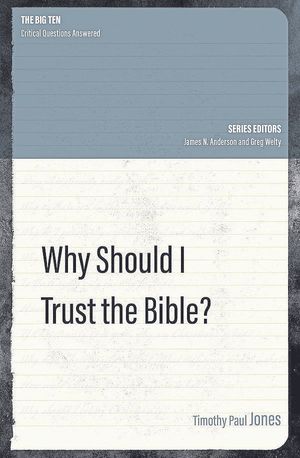We should trust the Bible, says Timothy Paul Jones, because it is ‘grounded in the words of a man who died and rose again’ (p.111). Jones’s basic presupposition is this: ‘If we live in a world where it is possible for a divine power to bring a dead man back to life, a divinely inspired collection of texts is not an unreasonable possibility’ (p.170).
Why Should I Trust the Bible? is aimed at the intelligent, open-minded sceptic, and with honesty, humility, and humour Jones presents a superbly-reasoned and highly readable defence of the Scriptures.
Beginning with an examination of the Gospels, Jones demonstrates that they ‘exhibit evidence of having been stitched together from reliable testimonies that are traceable to eyewitnesses’ (p.149). What, then, might the trustworthiness of the Gospels mean for the rest of the Bible? To trust in the resurrected Jesus, the author reasons, is to trust the texts he trusted (i.e. the Old Testament), and the writings of the people he commissioned to bear witness to him.
For such a short book, Jones manages to cover a remarkable amount of ground. He explains which books belong in the Bible, why they belong there, and how they got there. He argues that the whole Bible is to be trusted. ‘It’s simply not possible to follow Jesus faithfully,’ he argues, ‘while believing the Bible selectively’ (p.145).
Although I’ve been teaching the Bible and defending its trustworthiness for almost fifty years, I learned much from this book — although it was disappointing to read, ‘the cosmos as we know it has developed and grown more complex over billions of years’ (p.21). That said, I recommend Why Should I Trust the Bible? enthusiastically.
Mike Moore
Curry Rivel, Somerset




